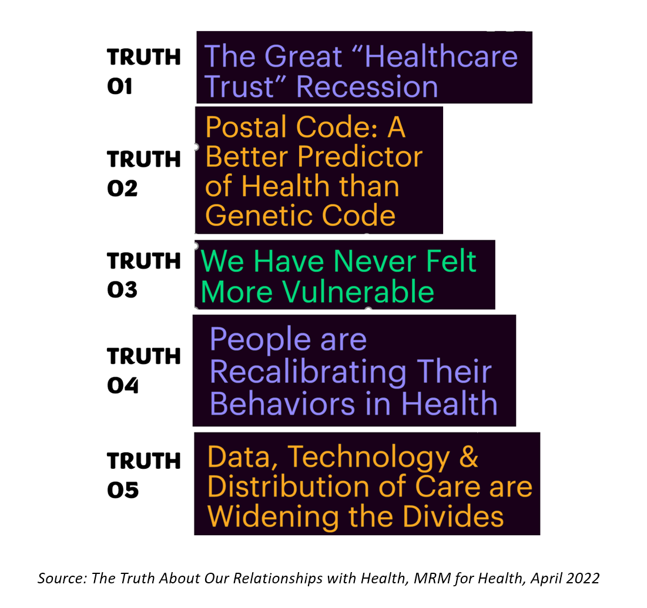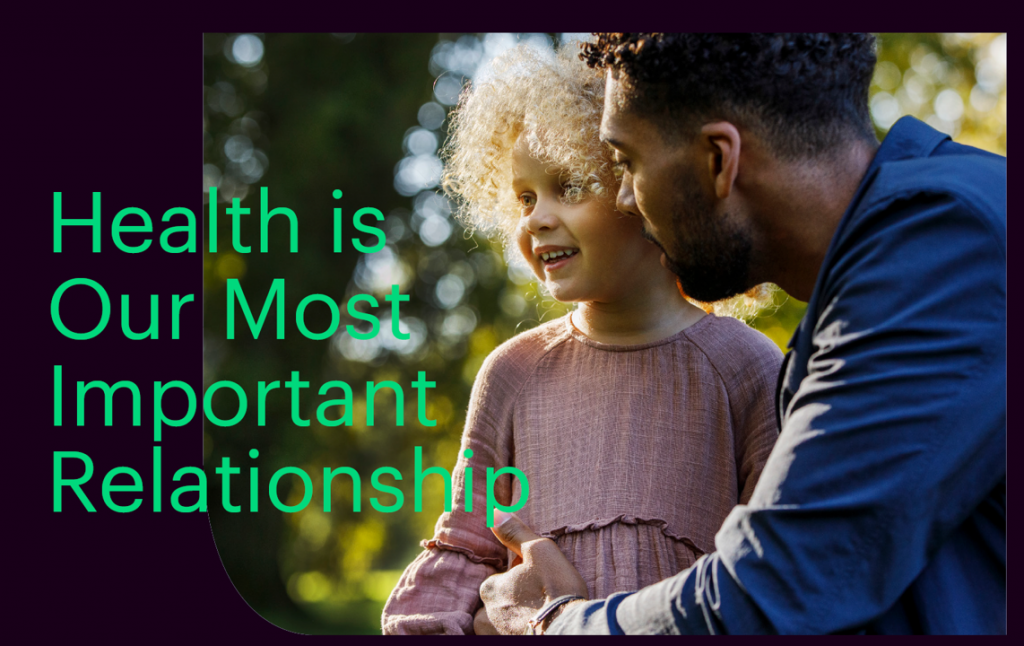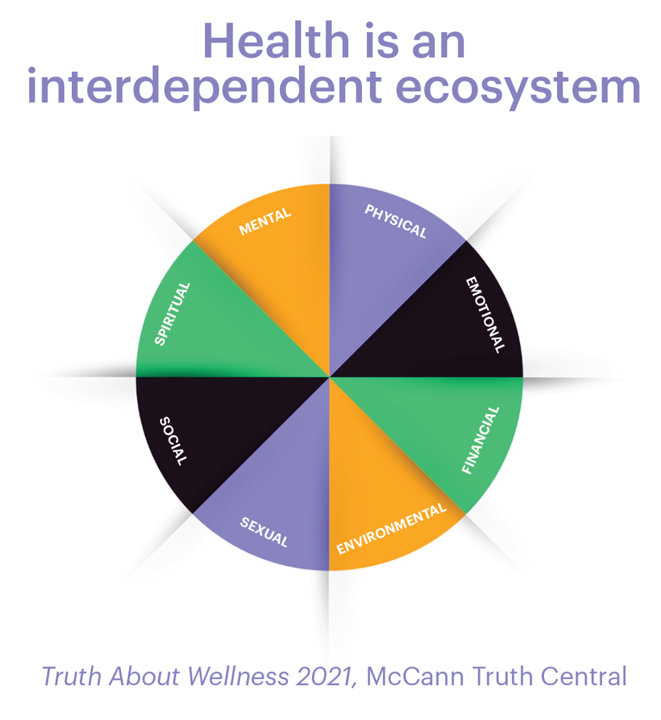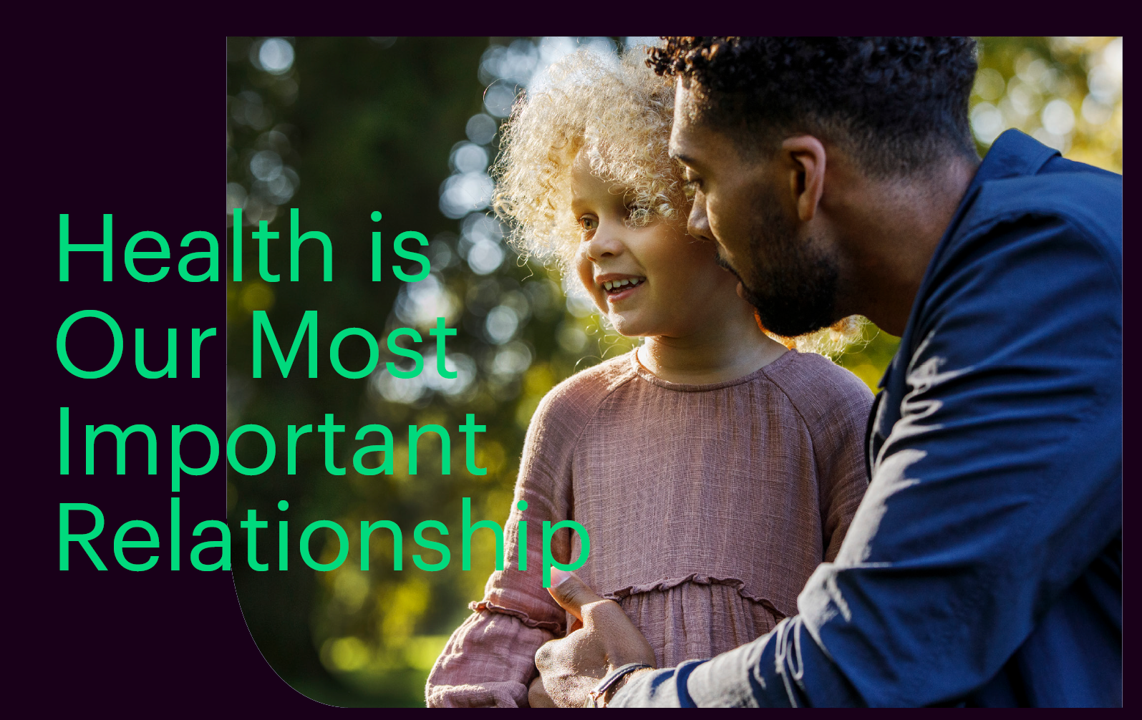We’ve hit a great “healthcare trust” recession around the world, translating into lower multiple points of medical ‘facts’ and pseudoscience, lower adherence to therapeutic regimens, and clinician burnout that has compromised medicine as the team sport it ideally should be.
 And that’s just one of five inconvenient truths unearthed in The Truth About Our Relationships with Health, the first in a series of papers that MRM is developing to, in their words, “look at the truths pr7eventing us from achieving a better relationship with our own health and with those along our health journey.”
And that’s just one of five inconvenient truths unearthed in The Truth About Our Relationships with Health, the first in a series of papers that MRM is developing to, in their words, “look at the truths pr7eventing us from achieving a better relationship with our own health and with those along our health journey.”
This report from MRM analyzes research globally, mashing those insights up with sister company McCann Truth Central’s own social and ethnographic research.
As the report’s press release defines the problem,
“Despite the unprecedented acceleration of knowledge, technology, and data across the health landscape, the reality is harsh: we are sicker, more fatigued, more disconnected than ever before.”
That’s due to four additional Truths MRM identified through its meta-analysis:
Truth 2, that one’s postal code is a better predictor for health than our genetic code
Truth 3, that we have never felt more vulnerable in a collective mental and behavioral health epidemic exacerbated by the pandemic
Truth 4, that people are recalibrating their behaviors in health, and,
Truth 5, that data, technology and the distribution of care are widening health disparities and divides in society.
 The promise of health for all is a Holy Grail that eludes us. While technology and science, medical “moonshots” and miracles like the fast-track success of the mRNA vaccine for the coronavirus, bolster our optimism, we are still left with pragmatic realities that EveryMan and EveryWoman are dealing with in this syndemic era emerging out of COVID-19 but met with inflation, the Great Resignation, civil distrust and lack of community spirit, and disillusionment.
The promise of health for all is a Holy Grail that eludes us. While technology and science, medical “moonshots” and miracles like the fast-track success of the mRNA vaccine for the coronavirus, bolster our optimism, we are still left with pragmatic realities that EveryMan and EveryWoman are dealing with in this syndemic era emerging out of COVID-19 but met with inflation, the Great Resignation, civil distrust and lack of community spirit, and disillusionment.
MRM calls the root of these challenges “the dichotomy of health and healthcare.” The irony is that “health” must be fundamentally human, but “healthcare” is a system built on sickness.
The solution: to revitalize people’s relationships with health, MRM asserts, in an ecosystem of trust across all stakeholders.
That’s a Big Hairy Audacious Vision, but it is what it is.
It’s the right path and prescription.
MRM offers seven active verbs that can set this flywheel of goodness in motion:
- Rekindle the human touch
- Refocus our relationship with health in all its scope
- Establish vocabulary and expectations
- Influence culture
- Given meaning to information
- Enable the physical or digital connection between people, and
- Democratize care.
A key takeaway from McCann Truth Central’s 2021 Truth About Wellness study was that most people globally believe creating a well and healthy world is the biggest challenge of the 21st century. So we can feel hopeful that health citizens around the world have bought into the concept that health is indeed a most important relationship…for ourselves and those we love.
 Health Populi’s Hot Points: How to act on those seven call-to-action items listed above the Hot Points here?
Health Populi’s Hot Points: How to act on those seven call-to-action items listed above the Hot Points here?
There’s no way to address health holistically and person-centered without embracing the fact that making health happens in the sandbox of an interdependent ecosystem.
Here is MRM’s graphic from the McCann Truth Central research, organizing eight aspects of the ecosystem for health:
- Physical
- Emotional
- Financial
- Environmental
- Sexual
- Social
- Spiritual, and
- Mental.
People define their overall health and wellbeing in these ways: each of us has our unique mix and alchemy of these elements, and perhaps others. But this eight-facet construct does a fine job getting us on the same page which is to recognize that determinants of health go way beyond medical care. And, some of us are blessed at birth with more of these gifts and blessings than others of us.
I so look forward to MRM’s ongoing journey further understanding our relationships with health, and I’ll be continuing to expand the concept of this interdependent ecosystem in my own work with clients that span that ecosystem — from food and technology to financial services and consumer goods.
And indeed, health providers, payers, pharma, med tech, and the most-trusted human capital in health care: nurses, physicians, and pharmacists.





 Thank you FeedSpot for
Thank you FeedSpot for